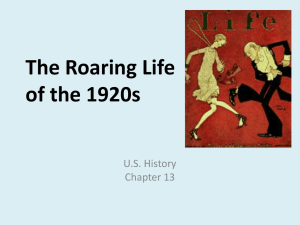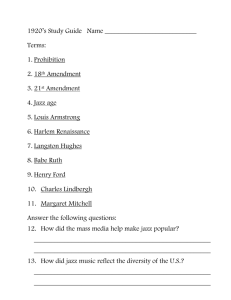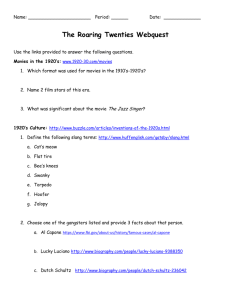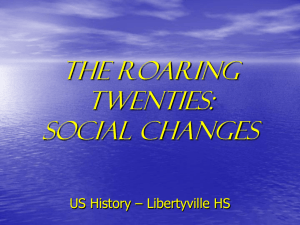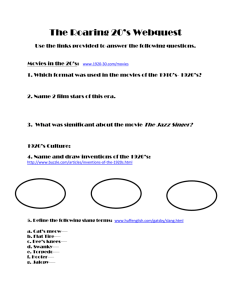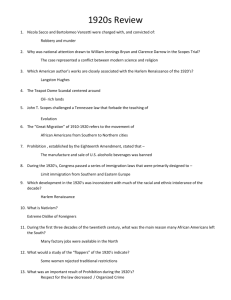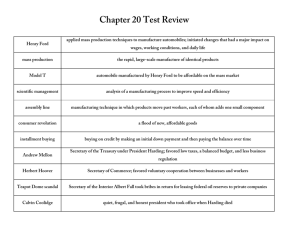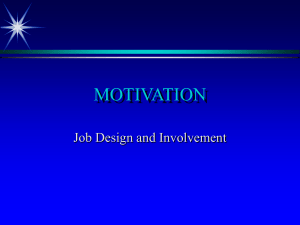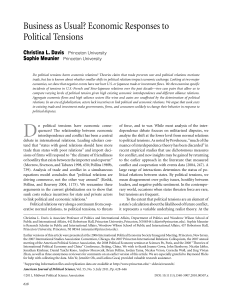Postwar Tensions & 1920s Culture in America
advertisement
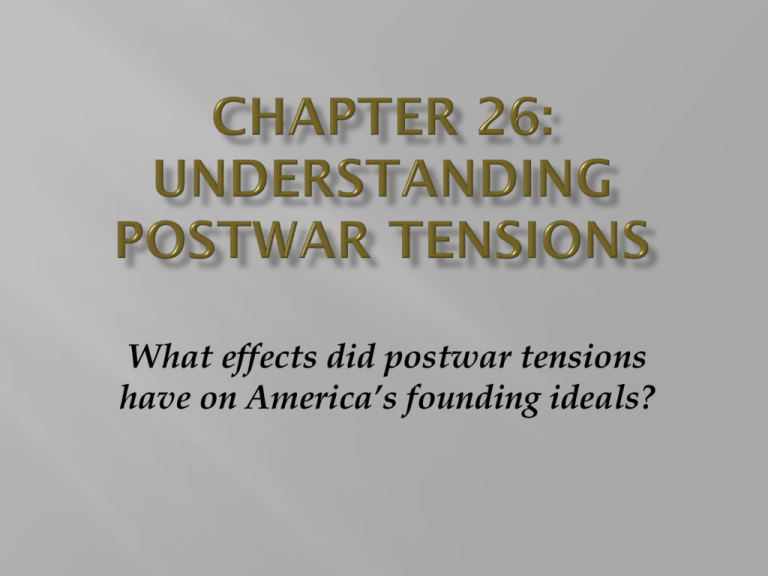
What effects did postwar tensions have on America’s founding ideals? Demobilization causes massive unemployment During WWI, industrial production doubled, agricultural production tripled And when the war ended? Inflation after the War Spending spree (after much saving) Inflation A rise in the general level of prices of goods and services in an economy When the price level rises, currency buys fewer goods and services Unemployment + Inflation = Recession Businesses return to prewar labor practices AFL (American Federation of Labor) No more cooperation or the mediation of disputes by the War Labor Board Corporations fought unions and the gains they had made Group of unions represented skilled laborers “bread and butter” issues (better wages/better conditions) The more radical Wobblies (I.W.W.) wanted more 3600 strikes across the U.S. in 1919 In Seattle 35, 000 shipyard workers were joined by 100,000 more in a general strike In Boston The police force walked off the job with the support and sympathy of the citizens, at first Anarchy resulted Calvin Coolidge as Governor of Massachusetts “There is no right to strike against the public safety by anybody, anywhere, any time.” Americans viewed unions as a threat Strike related violence could lead to anarchy The strikes didn’t achieve lasting effects “Politics” of union membership Unskilled workers often were left out Immigrants were not welcomed African-Americans were excluded The Supreme Court rejected child labor laws and minimum wage laws Senators, mayors, business leaders and even a Supreme Court justice either received bomb packages or were going to Radicalism = extreme change in the social or economic structures Could be Communists, Socialists or Anarchists (who are opposed to all systems of government) Communism called for the public ownership of all means of production leading to a classless society The Bolshevik Revolution in Russia accomplished this The Red Scare Attorney General Mitchell Palmer and his assistant J. Edgar Hoover raid homes, businesses and meeting places often without cause (known as “Palmer Raids”) Civil Liberties were trampled Nativism Emergency Immigration Act of 1921 Set quotas to limit immigration The Ku Klux Klan “they” could never be 100% American “they” are overcrowding our cities and taking our jobs Anti-Jewish, anti-black, anti-immigrant, anti-Catholic Their membership reached 3-4 million in the 1920’s In 1920 the ACLU was founded to defend those whose rights were being violated (not always popular) Race riots exploded as a result of the Great Migration Black veterans couldn’t find jobs (white veterans had their jobs taken by blacks) Back to Africa Movement Marcus Garvey Raised the question of a separate society versus an integrated one Anti-Semitism Prejudice against Jews The Anti-Defamation League (ADL) is founded to combat discrimination against Jews A Case Study for Understanding PostWorld War One America ECONOMIC TENSIONS: LABOR TENSIONS: POLITICAL TENSIONS: SOCIAL TENSIONS: Did the Republican Era of the 1920’s bring peace and prosperity to all Americans? What social trends and innovations shaped popular culture during the 1920’s? A new consumer culture New appliances, electricity in homes Advertising builds demand Installment buying allows credit Americans take to the road and air Charles Lindbergh and the Spirit of St. Louis become heroes Barnstorming air shows with wing walkers gain popularity Amelia Earhart flies solo across the Atlantic Henry Ford mass produces affordable automobiles The isolation of farm life ends Suburbs can grow Roadside advertising becomes big business The importance of mass media Newspapers and magazines keep Americans informed Radio pioneers like David Sarnoff provide entertainment (NBC) Music, comedies, dramas all on the radio People flock to movie houses The Jazz Singer was the first full length “talkie” “Radio told the masses what to do, movies showed them how to do it.” Fashions, hair styles, behaviors Women move toward greater equality League of Women Voters to educate women on the issues and support political activity Equal Rights Amendment championed by Alice Paul is proposed but never ratified Women enter professions, seek greater opportunities and rebel against traditional roles, clothing, behavior and customs Margaret Sanger opens the country’s first family planning clinic The “Jazz Age” Distinctly American form of music African rhythms, European harmonies, African-American folk music Improvisation not necessarily a written score Harlem in NYC doubled in population with the Great Migration The most famous club of all was the Cotton Club Harlem Renaissance “revival” or “rebirth” The Great Migration congregated black populations in large, northern cities war opportunities limits in immigration poor conditions in the south and oppression by whites None larger than in Harlem, New York Mother to Son by Langston Hughes Well, son, I’ll tell you: Life for me ain’t been no crystal stair. It’s had tacks in it, and splinters, And boards torn up, And places with no carpet on the floor - Bare. But all the time I’se been a-climbin’ on, And reachin’ landin’s, And turnin’ corners, And sometimes goin’ in the dark Where there ain’t been no light. So boy, don’t you turn back. Don’t you set down on the steps ‘Cause you finds it’s kinder hard. Don’t you fall nowFor I’se still goin’, honey, I’se still climbin’, And life for me ain’t been no crystal stair. Jazz Age Authors F. Scott Fitzgerald Moral emptiness, lost promises from World War I The Lost Generation Critical of American life Many headed to Paris e.e. cummings used no capital letters Artists like Georgia O’Keeffe found inspiration in nature How did social, economic and religious tensions divide Americans during the Roaring Twenties? TRADITIONALISTS Respect for long held social, cultural and religious values Those provide stability and order A desire for the “simple life” MODERNISTS Embrace of new ideas, styles and social trends Traditional values were chains that restricted individual freedoms and the pursuit of happiness Life in the City Wages and per capita income rose Standards of living improved Movies, museums, concerts, clubs Life in the Country New ideas and behaviors were cause for suspicion Crop prices fell after the war and farmers could not pay loans The Republican administrations did not want to interfere with the markets and help Small town values were mocked by modernists while the traditionalists fought to preserve and defend all that was good in American life Cities = immoral, materialistic, money-grubbing Fundamentalism in the country = the idea that religious texts and beliefs should be taken literally and treated as the ultimate authority on behavior Billy Sunday gained popularity as the most prominent fundamentalist preacher of the day Rural areas were losing population to the cities YOUTH PERSPECTIVE High School and college enrollment was growing Fads and trends develop Flappers w/ their new clothing styles and behaviors Mass media and cars provide “escapes” ADULT PERSPECTIVE The young were reckless and immoral The Hays Office issues moral codes for movie behavior Legislate more conservative behavior DRY PERSPECTIVE Support the 18th amendment (Volstead Act) for a happier and healthier society Prohibition would help control “foreign” influences WET PERSPECTIVE Government couldn’t (or shouldn’t) legislate morality Too difficult to enforce Speakeasies allowed drinking in secret clubs Bootleggers got rich EVOLUTION Charles Darwin CREATIONISM The Bible is the word of God EVOLUTION Natural Selection Survival of the Fittest “Social Darwinism” The fittest or most powerful should rule the less powerful Science can explain how the physical world works CREATIONISM Taken literally, “God created the Universe.” Fear of eugenics The human species could be improved by forbidding people with undesirable characteristics from reproducing Charles Darwin’s theory of evolution holds that inherited characteristics of a population change over generations, which sometimes results in the rise of a new species. According to Darwin, the human species may have evolved from an ape-like species that lived long ago. Fundamentalists think this theory is against the biblical account of how God created humans and that teaching evolution undermines religious faith. Laws were passed preventing evolution being taught in schools One group in Tennessee persuaded a young science teacher named John Scopes to violate the law, get arrested, and go to trial. Scopes was represented by Clarence Darrow, and William Jennings Bryan, three-time candidate for president, represented the prosecution. John Scopes was obviously guilty, but the trial was about larger issues. Scopes was convicted and fined $100 The Tennessee law remained in place until the 1960s.
